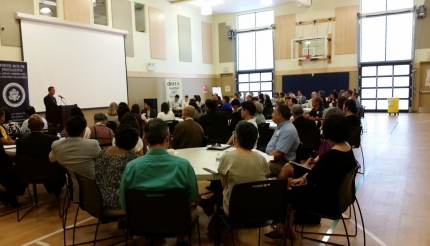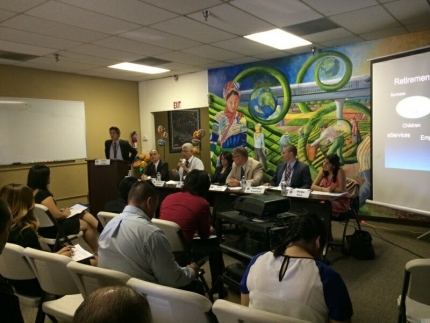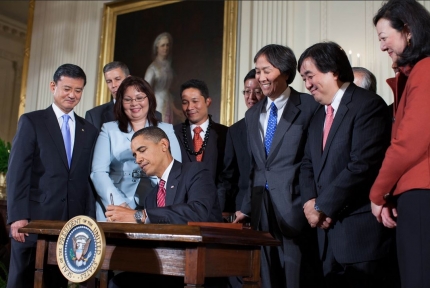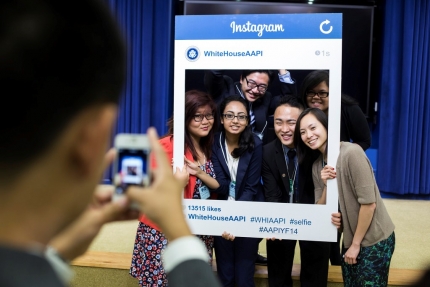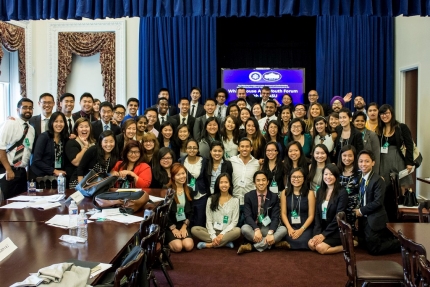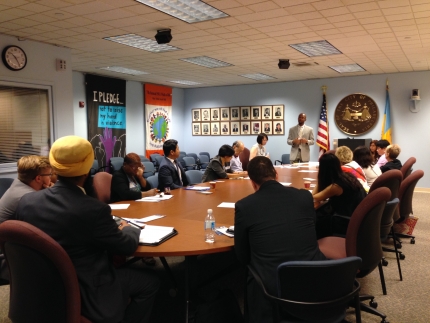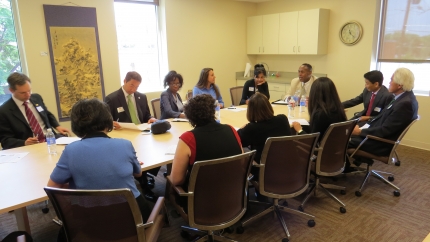Initiative on Asian Americans and Pacific Islanders Blog
WHIAAPI Roundtables Engage AAPI Communities in Seattle and Fresno
Posted by on August 1, 2014 at 1:50 PM ESTOver 60 advocates and leaders in the Asian American and Pacific Islander (AAPI) communities in the Fresno, California area attended the first community roundtable on July 10 hosted by the White House Initiative on AAPIs (WHIAAPI) Regional Interagency Working Group (RIWG). And further North, the RIWG in Seattle hosted a roundtable on July 14. In Seattle, there is a strong and proud AAPI community that has unique needs, much like Fresno. These roundtables presented the perfect opportunity for the community to connect with their local federal agencies.
The RIWG of Seattle hosted four workshops that focused on: small business development, immigration/ education, worker protection and human and health services. These workshops were facilitated by speakers from Small Business Administration (SBA), United States Citizenship and Immigration Services (USCIS), Equal Employment Opportunity Commission (EEOC), Department of Labor (DOL), Department of Health and Human Services (HHS), and the Social Security Administration (SSA). Speakers from these agencies engaged the audience and discussed available federal resources for AAPIs in these areas.
Similar activities occurred in Fresno as community leaders and advocates engaged in an open dialogue with RIWG panelists to discuss such issues.
- Access to grants and loans for community based organizations
- Struggles of Southeast Asian Americans, who represent a majority of AAPIs in the Fresno community and their struggles to overcome the “model minority” myth
- Agricultural challenges of AAPI farmers, including cultural and linguistic barriers
- Educational concerns and challenges for AAPIs
- Real and perceived barriers to accessing federal services
- Awareness for federal employees to be more culturally sensitive towards AAPIs
Throughout the day, the audience, which included both community members and federal employees, were able to engage in a healthy discussion. By having these discussions, community members were able to have their questions answered, and allowed federal employees better recognize the specific needs of the AAPI community. RIWG members appreciated the dialogue, reiterated their commitment to the AAPI community and encouraged advocates to continue to reach out to them.
At the end of the Seattle roundtable, we were able to have a report back that summarized the highlights of the day. Through the report back, one could finally understand the purpose of a roundtable when the community begins to feel that their voices are heard by their local federal agencies and the barrier between federal employees and the AAPI community has been lifted.
Advocates and community leaders left equipped with an arsenal of literature to add to their toolkit, a contact list of RIWG members, and continued support and commitment from RIWG members and their colleagues in attendance. The inaugural Fresno WHIAAPI RIWG roundtable as a success, as community leaders and advocates were able to bring to the table issues concerning Central Valley AAPIs and connect with federal resources. In Seattle, the roundtable fostered the relationship between the community and their federal agencies that will ultimately to the development of a stronger AAPI community in Seattle. There is a bright and prosperous future that lies ahead for the both the AAPI communities of Seattle and Fresno.
Ed Chu is the Associate Regional Administrator for the Seattle Area Environment Protection Agency and a member of the White House Initiative on Asian Americans and Pacific Islanders’ Region 10 Interagency Working Group. Tuan Nguyen is the central California Area Director for the Social Security Administration and a member of the White House Initiative on AAPIs’ Region 9 Interagency Working Group.
Learn more aboutIn Appreciation of Dr. Howard Koh, a Champion for Public Health and the AAPI Community
Posted by on July 29, 2014 at 2:33 PM ESTOn behalf of the White House Initiative on Asian Americans and Pacific Islanders (AAPIs) and the President’s Advisory Commission on AAPIs, we want to express our sincerest gratitude to Dr. Howard Koh as he concludes his time as the 14th Assistant Secretary for Health at the U.S. Department of Health and Human Services (HHS).
Prior to his service over the last five years as Assistant Secretary for Health, Dr. Koh has worn many hats in his endeavors to improve the health of our communities. He has served as a compassionate physician, a leading researcher in public health, and an exemplary public health commissioner for the state of Massachusetts. As our nation’s Assistant Secretary of Health, Dr. Koh has worked effectively and successfully within the federal government and with private sector and grassroots advocates to address the most important health issues of our time, including HIV/AIDS, tobacco control, behavioral health, childhood obesity, adolescent health, healthy nutrition, healthcare associated infections, immunizations, viral hepatitis, and environmental health. As our nation’s “Chief Prevention Officer,” he was a key contributor to the National Prevention Strategy, working to improve our healthcare system’s ability to provide more accessible and affordable early detection and disease prevention. Dr. Koh’s tenure as Assistant Secretary for Health is characterized by a strong commitment to improving healthcare access among low-income and medically underserved populations. He played a major role in historic federal efforts to decrease the number of uninsured Americans through the Affordable Care Act.
On October 14, 2009, Dr. Koh stood by President Obama when the President reestablished the White House Initiative on AAPIs. Dr. Koh has since been a leading voice in the ongoing work of the Initiative as a member of our Interagency Working Group and has brought national attention to health issues facing the AAPI community. During his tenure, HHS has made great strides in meeting the health needs of the AAPI community. For example, one of Dr. Koh’s legacies will be his leadership advocating for and implementing policies to collect AAPI health data disaggregated by country of origin and to oversample Asian Americans in the National Health and Nutrition Examination Survey (NHANES). He recognized that viral hepatitis B was a major health disparity for AAPIs and was a force behind the development of an Action Plan to address viral hepatitis implemented across HHS. Dr. Koh also led HHS efforts to revise and release the enhanced National Standards for Culturally and Linguistically Appropriate Services in Health and Health Care (National CLAS Standards). HHS implemented a nationwide outreach and education effort to promote awareness of the Health Insurance Marketplace through partnerships with community organizations, and Dr. Koh helped encourage AAPIs to access affordable health care during the AAPI Enrollment Week of Action.
Dr. Koh has certainly left a lasting legacy through his leadership. We believe that few other individuals have done as much for the health of the AAPI community in the last five years. He is a model physician who has crossed into the policy arena in order to affect and improve the health of our nation. While his work at HHS will truly be missed, the strong foundations he has laid for medically underserved communities in general and AAPI communities in particular, have benefitted each and every one of us.
Kiran Ahuja is Executive Director of the White House Initiative on Asian Americans and Pacific Islanders. Dr. Tung Nguyen is Chair of the President’s Advisory Commission on Asian Americans and Pacific Islanders.
Learn more aboutAANAPISIs: Serving a Critical AAPI Student Population
Posted by on July 23, 2014 at 11:59 AM ESTEd. note: This is cross-posted on the U.S. Department of Education's blog. See the original post here.
Recently I had the distinct privilege to join Education Secretary Arne Duncan when he met with Asian American, Native Hawaiian, and Pacific Islander education stakeholders to discuss a number of education issues affecting the community. They presented a range of issues, such as the importance of data disaggregation, addressing bullying/harassment, and serving native populations, as well as the significance of Asian American and Native American Pacific Islander Serving Institutions (AANAPISIs) in educating low-income, first generation college students, and helping to achieve President Obama’s goal of having the highest proportion of college graduates by 2020.
Attendees requested a clear statement that AANAPISIs are indeed within the same class of institutions as Historically Black Colleges and Universities and other minority-serving institutions under the Higher Education Act. Community members relayed that because of this lack of clarity, higher education institutions, advocates, and even federal agencies were uncertain whether AANAPISIs could qualify or apply for federal grant opportunities across the federal government.
In response to these concerns, the Department has updated its website. To the extent federal agencies utilize this statutory authority to target grants and programmatic opportunities, we recommend and encourage listing “Asian American and Native American Pacific Islander Serving Institutions (AANAPISIs)” along with the other classes of schools delineated under the HEA. In addition, the website clarifies that the specific definition of “Minority Institutions” (MIs) applies only to the Minority Science and Engineering Improvement Program (MSEIP) and other programs that reference the same MI definition, which includes Pacific Islanders but not Asian Americans.
Learn more about EducationWHIAAPI Launches E3! Ambassadors Program for Young Leaders
Posted by on July 22, 2014 at 6:36 PM ESTEvery summer, young Asian American and Pacific Islander (AAPI) leaders from across the country come to Washington, DC to intern and work in the nation’s capital. Monday, July 11, marked the beginning of AAPI Youth Leadership Week, a chance for young leaders to engage in discussions about public service and important issues facing the AAPI community. This year, we were proud to kick off AAPI Youth Leadership Week with a tour of the “Beyond Bollywood” Exhibition and roundtable discussions with Konrad Ng, Director of the Smithsonian Asian Pacific American Center, and Chris Lu, Deputy Secretary of the U.S. Department of Labor. Both Konrad and Deputy Secretary Lu described their career paths, reflected upon the challenges they faced along the way, and shared some of their best advice and guidance.
On Thursday, July 17, the White House Initiative on AAPIs and the White House Office of Public Engagement hosted an AAPI Youth Forum with the East Coast Asian American Student Union (ECAASU), gathering 100 young AAPI leaders at the White House. The Youth Forum began with keynote remarks by Tina Tchen, Chief of Staff to the First Lady, and continued with presentations and workshops on four focus issues: education, mental health, pathways to public service, and Deferred Action for Childhood Arrivals (DACA). Participants also had the chance to discuss issues unique to their region and develop targeted action plans.
As a result of last year’s Youth Forum, the Initiative launched its 2013-2014 Healthy Engaged Youth (HEY!) Ambassadors Program, encouraging young leaders to conduct outreach around the Affordable Care Act (ACA) within their campuses and communities. At this year’s Youth Forum, WHIAAPI launched its 2014-2015 E3! Ambassadors Program, which seeks to “Educate, Engage, and Empower” young leaders to increase awareness and outreach around the four aforementioned focus issues. Hosted on Challenge.gov, a portal for the federal government to post challenges that seek innovative solutions from the public, E3! affords young leaders the opportunity to brainstorm and implement their own unique ideas to help improve the quality of life and opportunity for young AAPIs.
Up to 150 applicants will be selected as E3! Ambassadors, who will serve for one academic year between September 1, 2014 and May 31, 2015. E3! Ambassadors will have the opportunity to work collaboratively with Administration leaders, including Initiative staff and members of the President’s Advisory Commission on AAPIs and Regional Interagency Working Group.
Please visit the Initiative’s website to learn more about E3! and the four focus areas, and help spread the word that the application deadline is August 17. Whether you’re applying to E3! or not, I encourage you to join the Initiative in its comprehensive efforts to educate, engage, and empower young AAPI leaders across the nation.
Jason Tengco is a Senior Advisor at White House Initiative on Asian Americans and Pacific Islanders.
TUNE IN: AAPI Youth Forum
Posted by on July 16, 2014 at 6:39 PM ESTTomorrow, July 17, 2014, the White House Office of Public Engagement and White House Initiative on Asian Americans and Pacific Islanders (AAPIs) will host an AAPI Youth Forum to engage young AAPI leaders in the work of the White House and the White House Initiative on AAPIs.
Tune in from 9:00 to 10:00 a.m. EDT for remarks by Tina Tchen, Assistant to the President and Chief of Staff to the First Lady. Following her remarks, you will hear from members of the Administration about education, mental health, pathways to public service, and Deferred Action for Childhood Arrivals (DACA).
To watch the event, tune in to the live stream from 9:00 a.m. to 10:00 a.m. EDT at WhiteHouse.gov/live.
Asian Americans and Pacific Islanders Converge for Community Roundtables in Pennsylvania and Colorado
Posted by on July 2, 2014 at 5:11 PM ESTWhen people think about Asian American and Pacific Islander (AAPI) communities, coastal states like California or New York might come to mind. However, Pennsylvania and Colorado are also home to a dynamic and growing number of AAPIs. Included in this mix are the more established groups such as Chinese Americans, Japanese Americans, and Filipino Americans mingling with recent immigrants from countries including Bangladesh, Indonesia, Cambodia, Thailand, Vietnam, Burma, and Bhutan. Although it is made up of a wide variety of cultures and nationalities, more often than not the AAPI community is thought of as a homogeneous group. For this reason, the White House Initiative on Asian Americans and Pacific Islanders (WHIAAPI) as well as the Regional Interagency Working Groups (RIWGs) are committed to giving underrepresented groups within the AAPI community a voice and the help that they need.
We recently hosted regional roundtables in Philadelphia, Pennsylvania (Region 3) and Denver, Colorado (Region 8). Representatives from several federal agencies and local community and business leaders were able to convene and discuss issues that affect the AAPI community in these two regions.
At the roundtables, the RIWGs introduced community members to the resources available within each agency before shifting to listening mode. Some federal agencies that attended the roundtables included the Department of Health and Human Services, Social Security Administration, Department of Labor, Small Business Administration, General Services Administration, Equal Employment Opportunity Commission, and U.S. Citizenship and Immigration Services. Community members then spoke about the health, small business, immigration, and civil rights issues that sit front and center in their daily lives. Many issues arose that are shared with various communities across the country – language access for limited English proficient communities in government, judicial, and health services, the shadow of the model minority myth and the attendant need for greater data disaggregation for the AAPI community, and concerns about immigration reform and protections for undocumented individuals.
Roundtable participants in both regions engaged in dialogue about topics of concern in their areas. In Philadelphia, there was talk about increasing access to small business loans from the Small Business Administration and increasing collaborations with the local Asian American Chamber of Commerce, as well as steps that could be taken to increase awareness about critical immigration policies without instilling fear.
In Denver, there were discussions over the emerging Bhutanese and Burmese communities and a strong interest in building the community infrastructure to enable greater communication and delivery of services for the diverse and geographically dispersed AAPI community in Colorado.
Collectively, both the Region 3 and Region 8 RIWGs will take the community’s feedback and create a plan to reach AAPI communities with the federal programs that can help address their issues. Whether a nonprofit wants to obtain a grant in order to run more efficiently or an individual needs in-language assistance to sign up for health insurance, we are here to make sure that communities get the services they need. These roundtables encourage continued collaborations between the RIWG and the local AAPI community, and we’re excited to take the next steps to further those partnerships.
Nina Ahmad is a member of the President’s Advisory Commission on AAPIs. Stephen Chen is a Supervisory Attorney for the Department of Education and leads WHIAAPI’s Region 8 Interagency Working Group.
- &lsaquo previous
- …
- 9
- 10
- 11
- 12
- 13
- 14
- 15
- 16
- 17
- …
- next &rsaquo
White House Blogs
- The White House Blog
- Middle Class Task Force
- Council of Economic Advisers
- Council on Environmental Quality
- Council on Women and Girls
- Office of Intergovernmental Affairs
- Office of Management and Budget
- Office of Public Engagement
- Office of Science & Tech Policy
- Office of Urban Affairs
- Open Government
- Faith and Neighborhood Partnerships
- Social Innovation and Civic Participation
- US Trade Representative
- Office National Drug Control Policy
categories
- AIDS Policy
- Alaska
- Blueprint for an America Built to Last
- Budget
- Civil Rights
- Defense
- Disabilities
- Economy
- Education
- Energy and Environment
- Equal Pay
- Ethics
- Faith Based
- Fiscal Responsibility
- Foreign Policy
- Grab Bag
- Health Care
- Homeland Security
- Immigration
- Innovation Fellows
- Inside the White House
- Middle Class Security
- Open Government
- Poverty
- Rural
- Seniors and Social Security
- Service
- Social Innovation
- State of the Union
- Taxes
- Technology
- Urban Policy
- Veterans
- Violence Prevention
- White House Internships
- Women
- Working Families
- Additional Issues
